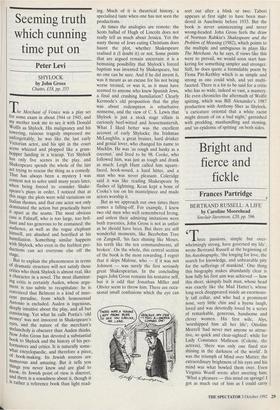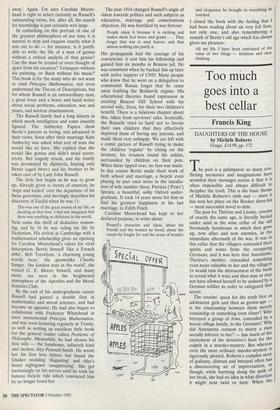Bright and fierce and fickle
Frances Partridge
BERTRAND RUSSELL: A LIFE by Caroline Moorehead Sinclair-Stevenson, £20, pp. 596 Tree passions, simple but over- whelmingly strong, have governed my life', wrote Bertrand Russell at the beginning of his Autobiography, `the longing for love, the search for knowledge, and unbearable pity for the sufferings of mankind.' One thing this biography makes abundantly clear is how fully his first aim was achieved — how this short, skimpily built man, whose head was exactly like the Mad Hatter's, whose long neck disappeared inside an enormous- ly tall collar, and who had a prominent nose, very little chin and a hyena laugh, loved and was devotedly loved by a series of remarkable, generous, handsome and clever women. His first wife, Alys, `worshipped him all her life'; Ottoline Morrell tad never met anyone so attrac- tive, so quick and clear-sighted'; while for Lady Constance Malleson (Colette, the actress), 'there was only one fixed star shining in the darkness of the world'. It was the triumph of Mind over Matter; the extraordinary brightness of his eyes and his mind was what bowled them over. Even Virginia Woolf wrote after meeting him: `What a pleasure — this mind on springs! I got as much out of him as I could carry
away.' Again, I'm sure Caroline Moore- head is right to select curiosity as Russell's outstanding virtue, for, after all, the search for knowledge is just curiosity writ large.
In embarking on this portrait of one of the greatest philosophers of our time it is natural to stop and enquire exactly what it sets out to do — for instance, is it justifi- able to write the life of a man of genius without a critical analysis of that genius? Can the man be treated or even thought of apart from his creation? Velasquez without his painting, or Bach without his music? This book is for the many who do not want to read Principia Mathematica, nor even understand the Theory of Descriptions, but for whom Russell is an extraordinary man, a great lover and a brave and lucid writer about social problems, education, war and peace, and nuclear disarmament.
The Russell family had a long history in which much intelligence and some insanity figured. The Amberley Papers show Bertie's parents as loving, and advanced in their views. Soon after their marriage Kate Amberley was asked what sort of sons she would like to have. She replied that she would like genius and didn't mind eccen- tricity. But tragedy struck, and the family was devastated by diptheria, leaving only Bertie (aged three) and his brother to be taken care of by Lady John Russell.
The little boy began as he was to grow up. Already given to bursts of emotion, he `wept and wailed' over the departure of his Swiss governess, and movingly describes his discovery of Euclid when he was 11:
This was one of the great events of my life, as dazzling as first love. I had not imagined that there was anything so delicious in the world. Next came the thrill of deductive reason- ing, and by 16 he was ruling his life by Hedonism. His arrival at Cambridge with a mathematical scholarship gives an opening for Caroline Moorehead's talent for vivid description: Bertie himself 'like a French abbe', Bob Trevelyan, 'a charming young woolly bear,' the gnomelike Charlie Sanger, 'the kindest man in the world', the wizard G. E. Moore himself, and many more, are seen in the heightened atmosphere of the Apostles and the Moral Sciences Club.
By the end of his undergraduate career Russell had gained a double first in mathematics and moral sciences, and had become an agnostic. He had also begun to collaborate with Professor Whitehead in their monumental Principia Mathematica, and was soon lecturing regularly at Trinity, as well as writing an excellent little book for the general reader called Problems of Philosophy. Meanwhile, he had chosen his first wife — the handsome, infinitely kind and tactless Alys Pearsall-Smith. He wrote her his first love letters, but found the Quaker wedding 'disgusting' and Alys's heavy nightgown 'unappetising'. She got increasingly on his nerves until he took his famous bicycle ride which convinced him he no longer loved her. The year 1914 changed Russell's angle of vision towards politics and such subjects as education, marriage and conscientious objection. He was horrified by war fervour:
People enjoy it because it is exciting and makes them feel brave and grand . . . They forget that war is mad horror, and that almost nothing can justify it.
His propaganda had the courage of his convictions: it cost him his fellowship and gained him six months in Brixton jail. He was consistent when he backed this up later with active support of CND. Many people who know that he went on a delegation to communist Russia forget that he came away loathing the Bolshevik regime. His educational theories found expression in creating Beacon Hill School with his second wife, Dora, for their two children's benefit. There is a hilarious chapter about this, taken from survivors' tales. Ironically, the Russells tried so hard not to favour their own children that they effectively deprived them of having any parents, and made them very unhappy. We are left with a comic picture of Russell trying to make the children 'regular' by sitting on the lavatory, his trousers round his ankles, surrounded by children on their pots. When these tipped over, no fuss was made. In due course Bertie made short work of both school and marriage, a bicycle even playing its part once more in the installa- tion of wife number three, Patricia (Teter') Spence, a beautiful, sulky Oxford under- graduate. It took 14 years more for him to find his greatest happiness in his last marriage, to Edith Finch.
Caroline Moorehead has kept to her declared purpose, to write about
Russell's character and ideas, about his friends and the women he loved, about the causes he fought for and the sense of wonder and eloquence he brought to everything he touched.
I closed the book with the feeling that I had been reading about six very full lives, not only one, and also remembering a remark of Bertie's old age which has always given me pleasure:
All my life I have been convinced of the value of two things — kindness and clear thinking.



















































 Previous page
Previous page